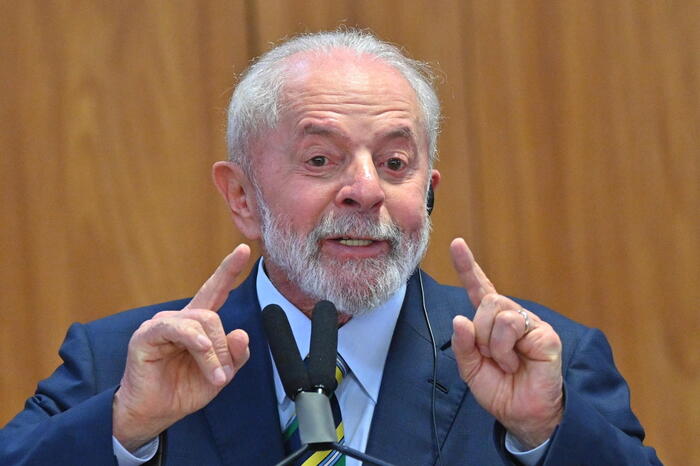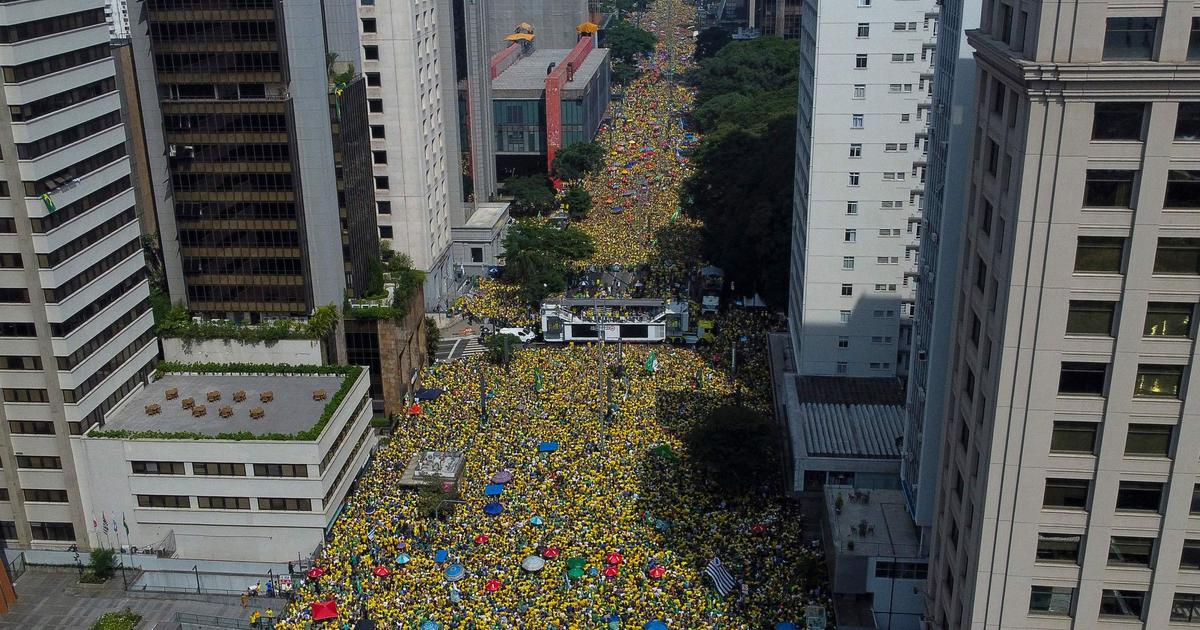A few days ago, the cable television news channels commemorated the second anniversary of the assault on the Capitol with the constant broadcast of videos recorded on January 6, 2021. Anyone who watched CNN last Thursday could see hours of images of some excited protesters who they broke through the weak police lines, stormed triumphantly into the Capitol and, filled with euphoria, wreaked havoc on the ultimate symbol of American democracy.
For this reason, the videos that those same channels began broadcasting on Sunday afternoon were eerily familiar.
Another time we saw protesters easily breaking through a weak line of police.
Once again, thousands of people stormed the most important buildings in the State with an expression of triumph on their faces.
And again there were grisly scenes of mob violence and vandalism, a grotesque carnival that went on for hours as the world watched.
But it was not the same: the new videos were not a repetition of the events that occurred in the United States two years ago, but a new version of the original horror film that showed events that were happening approximately 6,000 kilometers away. , in Brasilia, the capital of Brazil, and at that very moment.
The resemblance between the two scenes is not a matter of coincidence.
Since Jair Bolsonaro was elected president of Brazil in the fall of 2018, he consciously modeled himself in the image and likeness of Donald Trump.
Like Trump, Bolsonaro claims to be the true voice of the people, calling anyone who disagrees with him a traitor or a criminal.
Like Trump, he has tried to concentrate power in his hands and questioned the legitimacy of independent institutions like the courts and newspapers.
And like Trump, he has spent the past few years convincing his supporters that they should be wary of any election in which he doesn't win because the electoral system is rigged.
All this was of great concern to many political scientists before the presidential elections held in October of last year.
If Bolsonaro were to win a second term, they warned, he would have an even better chance of undermining the country's system of checks and balances.
Brazilian democracy would be in serious trouble.
But they also warned that even if Bolsonaro were defeated by his rival, former President Lula de Silva, the danger would still exist.
Because in that case, Bolsonaro could make the decision to encourage his followers to use violence to disrupt the transfer of power or even ask the army to come to his aid.
Some observers thought there would be a real possibility of a coup.
The positive news is that the Brazilians managed to oust Bolsonaro.
This, in a parallelism with Trump that he wanted to avoid at all costs, lost his re-election bid by a narrow margin.
In the weeks that followed, the top military commanders made it clear that they would not support a coup.
And it even seemed that he was abandoned by some of his former political allies, but who had been elected to important positions in those same elections, such as Tarcísio de Freitas, the new governor of São Paulo.
Bolsonaro capitulated and publicly ordered his team to ensure the orderly transfer of power to Lula.
In the two months between Lula's victory and his inauguration, many sinister things happened.
Bolsonaro never explicitly accepted the legitimacy of his defeat at the polls.
His supporters organized numerous protests, some of which ended in violence, such as the burning of dozens of cars in the center of Brasilia.
But, little by little, the final result began to seem inevitable.
On January 1, Lula was sworn in as president of Brazil.
Bolsonaro, fearing judicial investigations into possible crimes he committed during his tenure, ignominiously escaped to Florida, where he has rented a house near Disneyworld.
While Lula was sworn in as president, videos of Bolsonaro circulating on social media walking the aisles of an American supermarket and enjoying dinner at a Kentucky Fried Chicken.
Against that background, Sunday's attack on the fundamental institutions of Brazilian democracy — Congress, the Supreme Court and the presidential palace — seemed even more surreal.
When members of the MAGA [Make America Great Again] movement attacked the Capitol in Washington, they had no concrete plan on how to stage a coup.
What they did have was an immediate objective: to interrupt the certification of the presidential elections that were taking place at that time.
The Bolsonaristas who stormed the seats of democratic power in Brazil on Sunday also lacked a specific objective.
Neither Congress nor the Supreme Court were sitting.
Lula was hundreds of kilometers away and had already sworn in his position.
It was as if the agitators were playing dress-up as American insurgents.
As Brian Winter, editor-in-chief of
Americas Quarterly
, has quipped : "Brazil, I apologize that we keep sending you our worst ideas."
It is evident that the similarities between what happened in Brasilia and in Washington are not mere figments of the American imagination.
Brazil's own elected officials resort to the same parallelism.
Tabata Amaral, a young congresswoman from the center-left Brazilian Socialist Party, said it on Sunday: “We saw what happened in the United States Capitol.
But we didn't do enough to make sure it couldn't happen here."
However, we will not be able to fully appreciate the danger posed by authoritarian populists like Trump and Bolsonaro until we recognize that it is not just one would-be dictator imitating another.
Nor should we flatter Steve Bannon, crediting him with the ability to inspire great events in a foreign country by repeating the same talking points in a desperate attempt to be relevant.
What is happening in Brazil and the United States is due to the intrinsic logic of populist movements, which have been gaining more and more strength in numerous democracies around the world for the past decade.
Populists always claim that they represent the true will of the people.
Therefore, they consider that they have a compelling reason to reject the result of any election that they do not win, because, for someone who is the authentic voice of the people, it should be impossible to lose at the polls.
When the seemingly impossible occurs, they either have to admit that their claim that they were particularly in tune with the voters was an absurd hoax, or they have to console themselves with the conviction that it is their country's electoral institutions that are fraudulent.
In recent years, there have been some very reassuring signs about the ability of democracies to resist the rise of these populists.
After all, in both Brazil and the United States, voters removed an authoritarian populist from office after a single term.
Given how often a populist—for example, the Hungarian Viktor Orbán or the Turkish Recep Tayyip Erdogan—manages to entrench himself in power after coming to power, these latest successes are by no means negligible.
But if the history of this phenomenon teaches us anything—not only in Brazil and the United States, but also in countries as different as Italy, Thailand, and Argentina—it is that populists are capable of maintaining a prominent presence in the political system even after lose an election.
Even in the worst of times, the populist often retains the fervent support of a solid base of die-hard supporters, and as soon as the successor fails to deliver on his promises, suffers a financial crisis or is embroiled in a serious scandal, he can return to power.
In this sense, the insurrection that we have seen in Brazil is, even though no more than a few thousand people have participated, an ominous harbinger of what may happen in future elections.
The country remains deeply divided.
If Lula's government makes a mistake, which is possible, Bolsonaro could return triumphant from his exile in Florida.
And even if he loses the support of his followers, some other demagogue will undoubtedly take advantage of the mistrust in the political system that he has so effectively fostered.
When a patient has seizures, the immediate danger must be resolved.
But if the seizures are due to an underlying infection, such as meningitis, it's not enough to treat the most visible symptom.
In the long run, the real danger is disease.
And this seems to me a good analogy to explain what I think of violent insurrections, like the one that took place in Washington two years ago and the one in Brasilia last Sunday.
We must not underestimate the immediate threat they pose.
But neither should we ever forget that they are but the most scandalous manifestation of a much deeper malaise.
Yascha Mounk
is visiting professor at St. Antony's College, Oxford and author of
The Great Experiment: Why Diverse Democracies Fail and How to Make
Them Work (Paidós).
Translation by
María Luisa Rodríguez Tapia.
Subscribe to continue reading
Read without limits
Keep reading
I'm already a subscriber

/cloudfront-eu-central-1.images.arcpublishing.com/prisa/KEWSE67D3BORCOLFGTUCWBMJQU.jpg)







